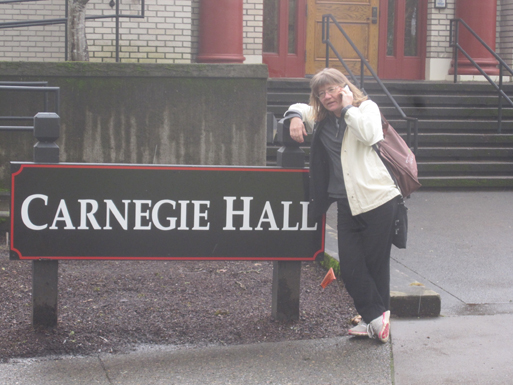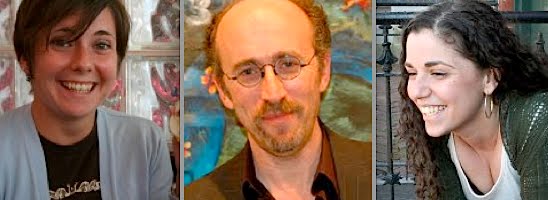LISTEN TO THE SHOW
Norman Fischer’s super-coherent overview of the book called Dementia Blog by Susan Schultz is a good way to begin: “Following the odd form of the blog, which is written forward in time but read backwards, it charts the fragmented disorienting progression (if this is the word) of her mother's dementia. Schultz sees through her family's personal tragedy to the profound social and philosophical implications of the unraveling of sense and soul: a deranged nation, so unmoored from coherence that it is unable to feel the difference between political rhetoric and the destructiveness of war.”
 For our 40th episode of PoemTalk, we gathered Jamie-Lee Josselyn, Michelle Taransky and Leonard Schwartz and discussed two relatively early blog entries in this work.
For our 40th episode of PoemTalk, we gathered Jamie-Lee Josselyn, Michelle Taransky and Leonard Schwartz and discussed two relatively early blog entries in this work.
Leonard responds to the matter of Schultz’s discovery of dementia as poetic form and he quotes Schultz on this point: “Reverse Stein. Not insistence but repetition.” “Stein,” says Leonard, “who insists it’s not repetition, that there is no repetition” but Schultz reverses that, based on the neurological reality facing her. Is this repeal of Stein a “big breakthrough”? asks Al - to which Leonard replies that it’s not really a critique of Stein, because finally “this book honors a kind of indeterminacy as ethics.”
Jamie-Lee argues that for Schultz memory is community and the state of being without memory is isolation. In the post-Holocaust sense, we won’t understand, and cannot successfully convey, what we write down about the trauma we witness. Schultz nonetheless chooses testimony a mode, and blog as form, not so much because she believes in the efficacy of bearing witness but because she wants to be part of this community and to stave off remoteness.
Michelle follows this by wondering if we can understand such writing as lyric – as embodying the qualities of the lyric poem. How is Schultz “somehow both expressing something personal – relating it to herself, her mother turning into not-her-mother – and at the same time there’s the very public [function, so that] someone else with a mother with dementia might read this and relate. Thus there’s somehow that ability to both be lyrical and to be poethical at the same time.” Michaelle isn’t certain that the blog form is what makes that convergence possible, but she suspects it might be.
Al had already written about the book on his own blog, where he concluded, perhaps a little too cutely, that “[t]he illness is the medium” – and then pondered the project’s novelistic aspects:
As you read this work you go backwards into the daughter's recent past to a point just when the mother begins to lose a grasp on her past. Ironically, conventional novelistic progression is repurposed for the digital mode that would normally undermine it. As we move toward the end (the beginning: Susan's return home from a vacation abroad to deal with her mother's first crises), we arrive at wholeness. Not Pip realizing his realistic place in London, nor Emma right-sizing the world into appropriate family pairings, nor even Clarissa Dalloway's party bringing the whole fractured cast together, but a happy-ever-after that is a moment in time just before the decline begins. In the end are things as they were.
The book can be purchased through Small Press Distribution. It was published by Singing Horse Press in 2008. PennSound’s Susan Schultz page is here; she recorded nine sections, or blog entries, specifically for PennSound – including, of course, the two we discuss. For his radio show, “Cross-Cultural Poetics,” produced in the studios of KAOS-FM at The Evergreen State College in Olympia, Washington, and made available through PennSound, Leonard Schwartz has interviewed Schultz several times. During the 180th show, he spoke with her about Dementia Blog and that interview is very much worth hearing along with this PoemTalk.








 For our 40th episode of PoemTalk, we gathered
For our 40th episode of PoemTalk, we gathered 
 For our 40th episode of PoemTalk, we gathered
For our 40th episode of PoemTalk, we gathered